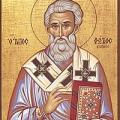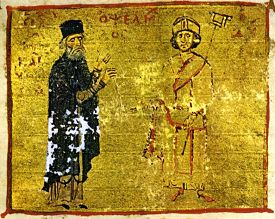307. Consul of the Philosophers: Michael Psellos
Michael Psellos and his attitude towards pagan philosophy and the political life.
Themes:
• C. Barber and D. Jenkins (eds), Reading Michael Psellos (Leiden: 2006).
• J. Duffy, “Hellenic Philosophy in Byzantium and the Lonely Mission of Michael Psellos,” in K. Ierodiakonou (ed.), Byzantine Philosophy and its Ancient Sources (Oxford: 2002), 139-56.
• M. Jeffreys and M.D. Lauxtermann (eds), The Letters of Psellos: Cultural Networks and Historical Realities (Oxford: 2017).
• A. Kaldellis, The Argument of Psellos’ Chronographia (Leiden: 1999).
• D. O’Meara, “Political Philosophy in Michael Psellos: the Chronographia Read in Relation to his Philosphical Work,” in B. Bydén and K. Ierodiakonou (eds), The Many Faces of Byzantine Philosophy (Athens: 2012), 153-70.
• D.J. O’Meara, “Michael Psellos,” in S. Gersh (ed.), Interpreting Proclus from Antiquity to the Renaissance (Cambridge: 2014), 165-81.
• D. Walter, Michael Psellos: Christliche Philosophie in Byzanz (Berlin: 2017).
• C. Zervos, Un philosophe néoplatonicien du XIe siècle. Michel Psellos (Paris: 1920).







Comments
Future episodes
It was an excellent episode and I was wondering if you will be doing an episode on Symeon the New Theologian.
In reply to Future episodes by Paschal Scotti
Symeon
Thanks, glad you liked it! I wasn't planning an episode on Symeon though his name will come up, I think. Do you think he deserves his own episode? (And if so what should it focus on?)
In reply to Symeon by Peter Adamson
Symeon
You have done episodes on other mystics before (and certainly he is one of those), and I have enjoyed how you have integrated them into the history of philosophy. Except for reading him (which I have found enjoyable and enlightening), I have not worked on him in any serious way. I am not sure if he deserves a whole episode (though if pushed I might include some of these other mystics in that list also), but he is important though less, I think, than Palamas later on--who is also a great mystic but where the philosophical issues may be more apparent.
In reply to Symeon by Paschal Scotti
Symeon
OK, thanks. Of course I will certainly be covering Palamas, perhaps I can fit in a short discussion of Symeon as background in that episode.
In reply to Symeon by Peter Adamson
I just noticed that there is
I just noticed that there is a discussion of Symeon in Basil Tatakis' "Byzantine Philosophy." Whether he belongs there is another question. I would hate to interfere in any way with the wonderful work you have done so far.
Psellus
It has been a while since I read parts of the De Omnifaria Doctrina (or more accurately Διδασκαλία παντοδαπή) but I think you are maybe being a little unfair on Psellos in regards to this work being simply a compilation. He does criticise Aristotle and even Plato's Theory of Ideas.
In reply to Psellus by Hermes
Psellos the compiler?
Right, I didn't quite mean to imply that - I was just trying to say that De Omn Doct fits into a pattern set by authors like Photius (whose Library is obviously also opinionated and has editorial remarks throughout). Remember that in the Photius episode I also tried to point out that "compilations" are often pretty interesting works. Still I take your point and will think about rephrasing for the book version, so thanks for pulling me up on this!
In reply to Psellos the compiler? by Peter Adamson
Yes, you did say that in the
Yes, you did say that in the Photius episode. Thanks for reminding. Regarding Psellos's criticisms of Aristotle and others, where I am stuck is whether his criticisms are somewhat original or are primarily the criticisms of earlier commentators made to look like his own which would bring us back to him being a compiler. He is a somewhat vain and I suspect this would not be beyond him. Perhaps O'Meara might have some insight on that on the next episode. Regardless, Psellos the Man is one of the people in Byzantium I would most like to have as a friend. He would probably stab me in the back at some point through some diabolical scheme by ending up in a monastery or my nose removed; but until then, the conversation and gossip would be very interesting.
Moderation of the passions
Hello professor,
Wonderful podcast and so wonderful I'm listening to the podcast again to date to miss much that I first didn't follow.
I was trying to find more about the moderation of the Passions, and the terms that you used in this episode. I may be misspelling the terms apotea and metreapotea, but I cannot seem to use Google searches to determine which of the items in your further reading list is the best to mine for this topic. Would you be able to point me in a proper direction, please?
In reply to Moderation of the passions by Dave Lavery
Passions
This is the peril of an audio podcast, I guess - hard to know how the technical terms are spelled! The words you want are apatheia (literally, "lack of being affected") and metriopatheia ("moderation in being affected").
In reply to Passions by Peter Adamson
Thanks
Thank you very much for the response. I was able to find quite a bit, though I didn't realize (or recall perhaps from earlier episodes) how far back the concept went. When you mentioned Psellos preference, I thought that he was trying to create the concept of the middle way as a solution. I didn't realize that it was an earlier idea being adopted.
Add new comment